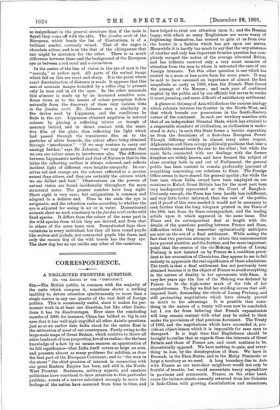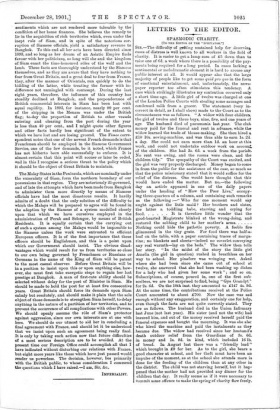CORRESPONDENCE.
A NEGLECTED FRONTIER QUESTION.
(To THE EDITOR OF THE "SPECTATOR.")
Snt,--The British public, in common with the majority of the units which compose it, sometimes shows a striking inability to devote attention synchronously to more than a single matter in any one quarter of the vast field of foreign politics. This is occasionally useful, since it makes for per- manent work in at least one direction, but like other limita- tions it has its disadvantages. Ever since the concluding months of 1900, for instance, China has bulked so big in our eyes that it has well-nigh engulfed all other Asiatic questions, just as at an earlier date India stood for the entire East in the estimation of most of our countrymen. Partly owing to the large-scale maps of Great Britain, which contrive to throw all other lands out of true proportion, few of us realise—for the bare knowledge of a fact by no means ensures an appreciation of its full significance—that India itself covers as large an area, and presents almost as many problems for solution, as does the best part of the European Continent; and to "the man in the street" the chief question of interest in connection with our great Eastern Empire has been, and still is, the North- West Frontier. Statesmen, military experts, and amateur politicians have combined to draw attention to this particular problem ; events of a nature calculated strongly to move the feelings of the nation have occurred from time to time, and have helped to rivet our attention upon it; and the Russian bogey, with which so many Englishmen are never weary of frightening themselves, has seemed to grin at us from over the border in a fashion which has got upon our nerves. Meanwhile it is hardly too much to say that the very existence of another and only less important frontier question has com- pletely escaped the notice of the average educated Briton, and has hitherto received only a very scant measure of attention from the men to whom is entrusted the care of our foreign interests. Yet this other question is one which has existed in a more or less acute form for some years. It may be said to have assumed an importance of almost the first magnitude as early as 1893, when the French Fleet forced the passage of the Menem; and each year of continued neglect by the public and by our officials but serves to render it more pressing, and more difficult of satisfactory settlement.
A glance at the:map of Asia will disclose the curious analogy which subsists between the frontier in the North-West, and that which bounds our possessions in the South-Eastern corner of the continent. In each our territory marches with that of an independent Oriental State, which has attained to a respectable standard of civilisation, as civilisation is under- stood in Asia ; in each this State forms a barrier separating us from the dominions of a first-class European Power. Though differing widely in almost every other respect, Afghanistan and Siam occupy politically positions that bear a remarkable resemblance the one to the other ; but while the main facts connected with our dealings with the former kingdom are widely known, and have formed the subject of close scrutiny both in and out of Parliament, the general public has been content to remain profoundly ignorant of everything concerning our relations to Siam. The Foreign Office seems to have shared the general apathy ; for while the best men whom India owned have been employed on our missions to Kabul, Great Britain has for the most part been very inadequately represented at the Court of Bangkok. Curiously enough, the Press has been hardly less indifferent, and very little better informed, than the rest of the public, and if proof of this were needed it would not be necessary to seek further than the long telegram printed in the Times of the 19th inst. from its Siam correspondent, and the leading article upon it which appeared in the same issue. The Times and its correspondent deal at length with the details of the questions pending between France and Siam, difficulties which they somewhat optimistically anticipate are now on the eve of a final settlement. While noting the fact that two previous attempts to attain this consummation have proved abortive, and the further, and far more important, point that the cession of the cis-Mekong portion of Luang Prabang is now insisted on by France gs a condition prece- dent to her evacuation of Chentabun, they appear to me to fail entirely to appreciate the real significance of these admissions. The truth is that a final settlement has not previously been obtained because it is the object of France to avoid everything in the nature of finality in her agreements with Siam. A very few years ago the line of the Mekong was declared by France to be the high-water mark of the tide of her acquisitiveness. To-day we find her striding across that self- imposed limit, demanding the whole of Luang Prabang, and still protracting negotiations which have already proved so much to her advantage. It is possible that some- thing in the nature of a treaty will soon now be concluded, but I am far from believing that French expansionists will long remain content with what may be ceded to them under the provisions of that precious document. The Treaty of 1893, and the negotiations which have succeeded it, pro- vide an object-lesson which it is impossible for sane men to disregard. It is high time that Englishmen should be brought to realise that as regards Siam the interests of Great Britain and those of France are, and must continue to be, diametrically opposed. We have nothing to gain, and every- thing to lose, by the disintegration of Siam. We have in Burmah, in the Shan States, and in the Malay Peninsula as large a territory as we need. A long boundary-line in Asia with France as our next-door neighbour would not only be fruitful of trouble, but would necessitate heavy expenditure in garrisons and armaments. France, on the other hand, scans the balance-sheets annually returned from her Colonies in Indo-China with growing dissatisfaction and uneasiness, - sentiments which are not rendered more tolerable by the condition of her home finances. She believes the remedy to lie in the acquisition of rich territories which, even under the inept rule of Siam, and in spite of the notorious cor- ruption of Siamese officials, yield a satisfactory revenue to Bangkok. To this end all her acts have been directed since 1893, and so long as her dream of an Asiatic Empire finds favour with her politicians, so long will she and the kingdom of Siam enact the time-honoured roles of the wolf and the lamb. These facts are thoroughly understood by the Siamese themselves, and as they are aware that they have nothing to fear from Great Britain, and a great deal to fear from France, they, after the manner of Orientals, run quickly to do the bidding of the latter, while treating the former with in- difference not unmingled with contempt. During the last eight years, therefore, the influence of this country has steadily declined at Bangkok, and the preponderance of British commercial interests in Slain has been lost with equal rapidity. In 1893, for instance, nearly 90 per cent. of the shipping in the Menam was under the British flag; to-day the proportion of British to other vessels entering and clearing from the port during the year is less than 40 per cent., and I might quote other figures and other facts hardly less significant of the extent to which we have lost and are losing ground. The Times corre- spondent notes that one of the newest French demands is that Frenchmen should be employed in the Siamese Government Service, one of the few demands, be it noted, which France has not hitherto been able successfully to enforce. It is almost certain that this point will sooner or later be ceded, and in this I recognise a serious threat to the policy which it should be the object of Great Britain to maintain.
The Malay States inthe Peninsula, which are nominally under the suzerainty of Siam, form the northern boundary of our possessions in that region. They are notoriously ill-governed, and of late the attempts which have been made from Bangkok to administer them more directly by means of Siamese officials have had the most disastrous results. It hardly admits of a doubt that the only solution of the difficulty to which the Malays will be prepared to agree will be found in the adoption by the Siamese of a system modelled closely upon that which we have ourselves employed in the administration of Perak and Selangor, by means of British Residents. It is equally certain that the carrying out of such a system among the Malays would be impossible to the Siamese unless the work were entrusted to efficient European officers. It is of the first importance that these officers should be Englishmen, and this is a point upon which our Government should insist. The obvious disad- vantages which would result for us from territories so close to our own being governed by Frenchmen or Russians or Germans in the name of the Sing of Siam will be patent to the most casual observer. Before Great Britain will be in a position to insist upon this or upon anything else, how- ever, she must first take energetic steps to regain her lost prestige at Bangkok. A man of first-rate ability should be selected without delay for the post of Minister in Siam. He should be made to hold the post for at least five consecutive years. Great Britain should force its demands upon Siam calmly but resolutely, and should make it plain that the sole object of those demands is to strengthen Siam herself, to delay anything in the nature of a partition of her territories, and to prevent the occurrence of all complications with other Powers. We should openly assume the rale of Siam's protector against aggression, since our own interests are at one with hers. We should do our utmost to aid her in concluding a final agreement with France, and should let it be understood that we insist upon such an agreement being really final. It is only by taking such action now that future difficulties of a most serious description are to be avoided. At the present time our Foreign Office could accomplish all that I have indicated without disturbing our relations with France, but eight more years like those which have just passed would render us powerless. The decision, however, lies primarily with the British public, to whose. consideration I commend the questions which I have raised.—I am, Sir, &c.,
IMPERIALIST.



































 Previous page
Previous page